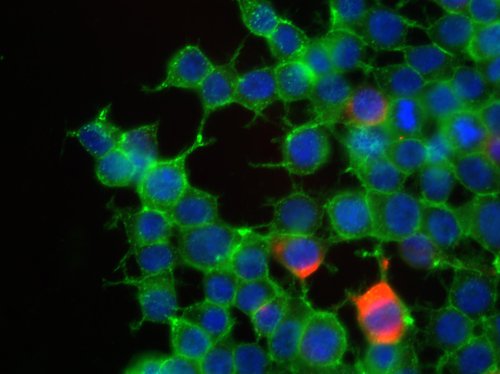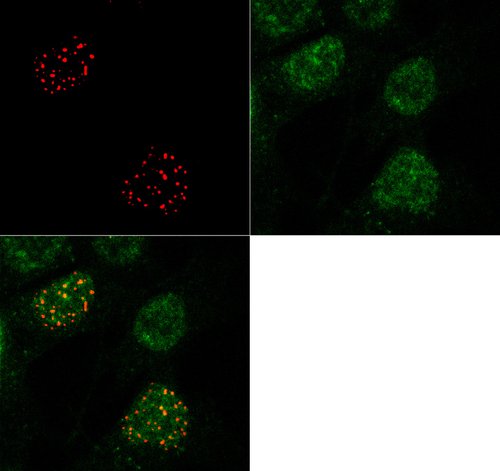Doctoral Study Programme Molecular Genetics and Biotechnology
| Study programme: | Doctoral study programme Molecular Genetics and Biotechnology |
|---|---|
| Main fields of study: | molecular genetics and biotechnology |
| Programme code: | 3MG |
| Programme cycle: | Third cycle doctoral degree |
| Name of the qualification: | Doctor`s degree |
| Qualification title: | Doctor of Philosophy |
| Qualification abbreviation: | Ph.D. |
| Final examination: | no |
| Dean: | prof. dr. Iztok Arčon |
| Programme director: | prof. dr. Martina Bergant Marušič |
| ECTS coordinator: | prof. dr. Iztok Arčon |
Programme description
Doctoral study programme »Molecular Genetics and Biotechnology« is the result of a joint effort with The International Centre for Genetic Engineering and Biotechnology (ICGEB) from Trieste, Italy. It enables an education of young scientists with the ability to apply the knowledge acquired in different fields. As molecular biologists they may work in the fields of public health, nutrition and environmental protection/remediation. As biotechnologists they will apply the latest techniques in the fields of industrial production of products useful for humans. The teaching and learning main activities of the study course include intensive research activity, seminars and communication training in Journal Clubs.
Lectures and exams are given in English.
The Senate of the University of Nova Gorica at its 75th session held on 18 January 2017 approved the extension of the Doctoral Degree study programme Molecular Genetics and Biotechnology from the current three years (180 ECTS) to four years (240 ECTS).
The four-year doctoral programme will start in the academic year 2017/2018.
Students who are currently enrolled in the three-year study programme will complete studies at the three-year programme.
Information for students
Intensive Slovenian language course
Seminars
Basics in molecular biology and biotechnology
Admission requirements
To qualify for entry into the Doctoral Degree study programme Molecular Genetics and Biotechnology, applicants must satisfy the following admission requirements:
- have completed a 2nd cycle master’s study programme;
- have completed at least a four-year academic undergraduate programme accredited with 240 ECTS credits;
- have completed a uniform five year master’s study programme accredited with 300 ECTS credits;
- have completed a specialization after previously finished professional study programme, and had passed additional study obligations within 30 to 60 ECTS credit points;
- have completed an equivalent program abroad.
- The candidate's background in life sciences, biotechnology or biomedicine is highly appreciated.
If the number of applicants exceeds the 20 available slots, they are selected based on previous academic achievement.
Courses given per year
1st year| Compulsory subjects | 23 ECTS |
| Chosen subjects | 3 ECTS |
| Research | 34 ECTS |
| TOTAL | 60 ECTS |
| Compulsory subjects | 14 ECTS |
| Chosen subjects | 6 ECTS |
| Research | 40 ECTS |
| TOTAL | 60 ECTS |
(For 3 year study programme.)
| Compulsory subjects | 14 ECTS |
| Research | 16 ECTS |
| Dissertation | 30 ECTS |
| TOTAL | 60 ECTS |
(For 4 year study programme)
| Compulsory subjects | 14 ECTS |
| Research | 46 ECTS |
| Seminar III | 4 ECTS |
| TOTAL | 60 ECTS |
The condition for enrolling in the fourth year is completion of requirements of all three years (180 ECTS credit points).
4th year(For 4 year study programme.)
| Research | 30 ECTS |
| Dissertation | 30 ECTS |
| TOTAL | 60 ECTS |
Educational and professional goals
The doctoral degree study programme is expected to provide graduate students with all the necessary means to understand a scientific investigation in the field of life sciences, develop independent thought and critical view, personal responsibility and decision making.
Student’s projects are normally a continuation, along different lines, of the wider research programme of the hosting group. Scientific activity focuses on several advanced research programmes that include basic science projects such as control of gene expression, DNA replication, DNA repair and RNA processing; studies on human viruses, molecular immunology, molecular genetics, experimental haematology and human gene therapy. Other projects are carried out in the fields of bacteriology and yeast genetics, plant virology, protein structure and bioinformatics. Student should reach from a minimum acceptable knowledge and skill level in the specific research area in the beginning, to an excellent performance that demonstrates in-depth understanding of the subject, ability to apply the knowledge acquired to analyses, interpret and critically evaluate data and results, at the end of his/hers study.
Assessment
Knowledge is assessed by oral examinations and seminar papers.
Programme progression requirements
In order to proceed to the second year of study, candidates must obtain at least 50 credit points. To enrol into the third year of the Molecular genetics and biotechnology doctoral study programme, candidates must fulfil all first-year requirements as well as obtain 50 credit points from the second year of study.
”Method of assessing the student's knowledge depends on the content and the way the individual learning units.
Assessment of student work is done in the form of project reports, public presentations of the results and critically-controversial discussions in front of Faculty Committee. For Seminar I, II, III assessment is quantified from 1 to 10. To proceed to dissertation, a grade of 8/10 is required. The student completed studies with the thesis defense before the three-member commission."
Courses refresh
1. year
| Compulsory courses | Hours | ECTS |
|---|---|---|
| Basics in molecular biology and biotechnology | 90 | 3 |
| Modern trends in molecular biology and biotechnology I | 300 | 10 |
| Research I | 1020 | 34 |
| Seminar I | 300 | 10 |
| General elective courses | Hours | ECTS |
| Elements of Biostatistics and Bioinformatics | 40 | 3 |
| Medical biotechnology : Nanomedicine | 90 | 3 |
| Plant biotechnology | 90 | 3 |
| Practical or theoretical course I | 90 | 3 |
| Regenerative medicine and tissue engineering | 90 | 3 |
| Selected Topics in Biomedicine and Biotechnology | 90 | 3 |
| Structural and Computational Biology | 90 | 3 |
2. year
| Compulsory courses | Hours | ECTS |
|---|---|---|
| Modern trends in molecular biology and biotechnology II | 300 | 10 |
| Research II | 1200 | 40 |
| Seminar II | 120 | 4 |
| General elective courses | Hours | ECTS |
| Medical biotechnology : Nanomedicine | 90 | 3 |
| Plant biotechnology | 90 | 3 |
| Practical or theoretical course II | 90 | 3 |
3. year
| Compulsory courses | Hours | ECTS |
|---|---|---|
| Modern trends in molecular biology and biotechnology III | 300 | 10 |
| Research work 3 | 1380 | 46 |
| Seminar III | 120 | 4 |
4. year
| Compulsory courses | Hours | ECTS |
|---|---|---|
| Dissertation | 900 | 30 |
| Research work IV | 900 | 30 |





